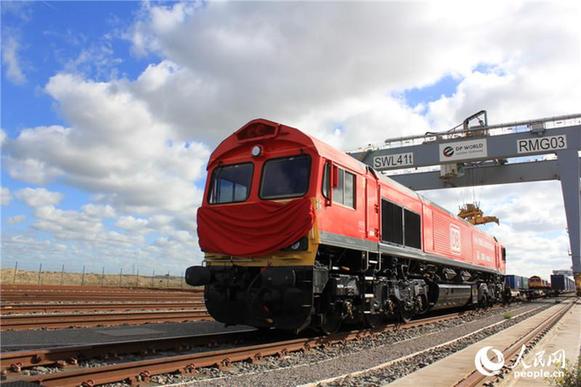Britain's trade direction and the new Silk Road
- By Sumantra Maitra
 0 Comment(s)
0 Comment(s) Print
Print E-mail China.org.cn, April 13, 2017
E-mail China.org.cn, April 13, 2017
|
|
|
The first Anglo-Chinese rail freight service set off on a 17-day marathon journey of over 12,000 km starting from Stanford-le-Hope, Essex, and ending in Yiwu of Zhejiang Province in eastern China. After passing through the Channel Tunnel, the route takes it across France, Belgium, Germany, Poland, Belarus, Russia and Kazakhstan. [Photo/People.cn] |
The first Anglo-Chinese rail freight service set off on a 17-day marathon journey of over 12,000 km starting from Stanford-le-Hope, Essex, and ending in Yiwu of Zhejiang Province in eastern China. After passing through the Channel Tunnel, the route takes it across France, Belgium, Germany, Poland, Belarus, Russia and Kazakhstan.
This new route, part of the Belt and Road Initiative, seeks to recreate the ancient classical trade route known as the Silk Road that existed between the two continents, and revolutionize trade communications, being cheaper than by sending goods by air, and it is faster than sending them by sea.
The first train from China to London arrived three months back. The only thing delaying arrival in each direction is the fact that the train's containers have to be loaded onto different wagons in Belarus as the countries of the former Soviet Union use a different, broader gauge.
The train from the Chinese side reaching the U.K. in January was filled with retail goods and garments. The one now heading in the opposite direction contains soft drinks, vitamins, baby products, and, of course, whisky.
A delighted U.K. trade minister said the event proved the Chinese market had a high demand for British goods. Such sentiments are understandable, as Britain has much to hope and expect from this relationship in a post-Brexit world. Britain's continued trade equilibrium is dependent on getting India and China on board once it leaves the EU single market.
Two things emerge from this endeavor: First, leaving the EU won't influence U.K. trade prospects and behavior and engagement with its former partners, which is proved by the interoperability of the train service passing through the EU. The second point is that Britain is seeking to prove it is still a place to invest even after Brexit. In fact, Britain and China can actually trade in goods now barred under EU rules and protectionism.
According to British Minister of Trade Greg Hands, "This new rail link with China is another boost for global Britain, following the ancient Silk Road trade route to carry British products around the world.
"It shows the huge global demand for quality U.K. goods and is a great step for DP World's £1.5 billion London Gateway port as it also welcomes its first regular container ships from Asia."
In a way, this is correct. U.K. will still be an export nation post-Brexit. There will continue to be heavy demand of U.K. products, while it will remain a giant market for cheap retail products, including Chinese products.
In this optimistic environment, Feng Xubin, the chairman of Yiwu Timex Industrial Investment, was quoted as declaring: "We are proud to be able to offer the first ever U.K. to China export train. Restoring the ancient Silk Road as a means by which China, northern Europe and now the U.K. can exchange goods is an important and exciting initiative."
It is important for Britain to get this right. If it can indeed achieve compromises for a smooth exit from the EU, this new rail route will be immense in the next five to ten years and brings forth wide-ranging benefits. In an age, where protectionism and populism are on the rise, this is Britain and China's chance to stabilize global trade and provide an alternative route for growth.
Sumantra Maitra is a columnist with China.org.cn. For more information please visit:
http://china.org.cn/opinion/SumantraMaitra.htm
Opinion articles reflect the views of their authors only, not necessarily those of China.org.cn.






